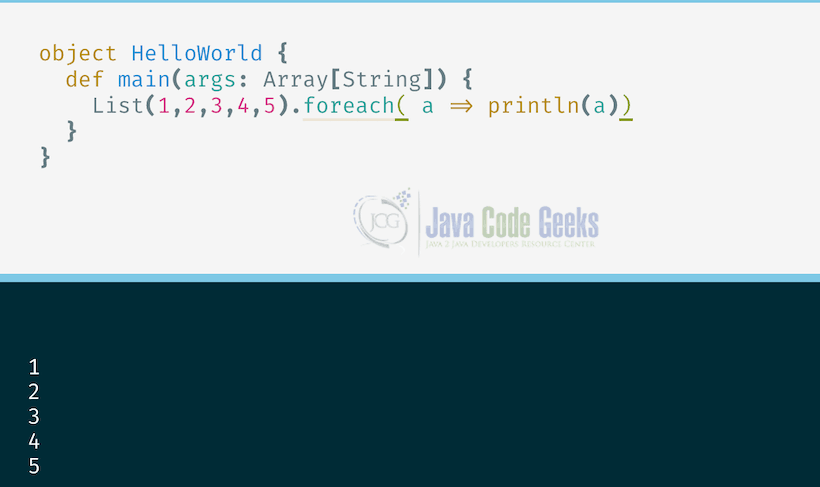
To do so, you prefix the body of the 'for' expression by the keyword yield. You can store return values from a "for" loop in a variable or can return through a function. To add more than one filter to a 'for' expression, separate the filters with semicolons( ). Following is the syntax of for loop along with filters. Scala's for loop allows to filter out some elements using one or more if statement(s). The following syntax for loop with collections. Following is an example of using just two ranges, you can use more than two ranges as well. You can use multiple ranges separated by semicolon ( ) within for loop and in that case loop will iterate through all the possible computations of the given ranges. Try the following example program to understand loop control statements (for statement) to print loop with the range i until j in Scala Programming Language. The simplest syntax of for loop with ranges in Scala is − There are various forms of for loop in Scala which are described below − Syntax − for loop with ranges input_list.A for loop is a repetition control structure that allows you to efficiently write a loop that needs to execute a specific number of times. A foreach loop in Scala is simply a loop that can be used to iterate over a range of elements for simply printing those elements, calculating the sum of these elements, finding and replacing any particular element, finding the maximum element out of these elements, etc. anycodings_scala You don't need foreach and the anycodings_scala outputList variable. It assumes you anycodings_scala do some calculation that doesn't return anycodings_scala anything. If you anycodings_scala look at the signature, the return value anycodings_scala should be Unit - which means the method anycodings_scala doesn't return a value. Your function inside the foreach method anycodings_scala returns the outputList value. anycodings_functional-programming any help is really appreciated. I am having a hard time writing the logic. Val res: String = getString(row, columnNames)ĭef getString(row: Row, schemaNames: List) : String =

it returns the final string which i want to add to outputList. Here i am iterating the input_list where i pass each ele to getString() method where Val columnNames : List = new List("Hello", "world") load(path) // this is spark dataframe, which has rows. The localinfile variable always enabled for all the above cases. is there a fire in manhattan right now north port police chase chicago housing.
#SCALA FOREACH CODE#
On removing the LOCAL modifier, the query is executed successfully, but the prerequisite is that the data file needs to be on the server host. Databricks foreach batch freedom elementary school pictures meaning of 8 in twin flame old fire stations for sale in south carolina ohio revised code speed limits golang runtime scanobject hillsboro police news commercial land for sale sunshine coast. I am trying to loop anycodings_functional-programming over a list of rows (can think as strings), anycodings_functional-programming where each string will be passed to a anycodings_functional-programming different scala method, where I am doing anycodings_functional-programming some manipulation on the input string and anycodings_functional-programming then return a string to the for-loop.īelow is not the working code, but this is anycodings_functional-programming what I am expecting to work. But when the LOAD LOCAL query is executed in a new connection to the same server in SQLyog, then it works as expected. I am a newbie to scala (and functional anycodings_functional-programming programming, basically).


 0 kommentar(er)
0 kommentar(er)
